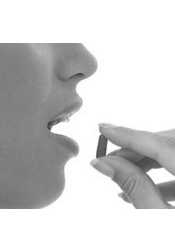Auro-moxifloxacin
This product is manufactured by Auro Pharma Inc using the ingredient moxifloxacin.
This product is taken orally.

play
orally
Why is it prescribed?
Moxifloxacin is used to treat infections caused by various bacteria. This material will be limited to the treatment of respiratory tract infections (e.g. pneumonia, bronchitis).
Use exactly as prescribed.
Moxifloxacin can be taken with or without food.
Drink plenty of clear fluids (e.g. water) during treatment.
Do not crush or chew the tablets, swallow each one whole. Avoid antacids containing aluminum or magnesium.
If you are taking antacids or vitamin/mineral supplements while on this medication, you should take it at least 4 hours before or 8 hours after taking the supplement. Take at approximately the same time each day (every 24 hours) until finished. Failure to take the complete course can result in incomplete elimination of the bacteria which can lead to a relapse of the infection. The prescribed course generally lasts a few days longer than symptoms of the infection (e.g. fever). Treatment usually lasts 7 to 14 days. If you miss a dose, take it as soon as possible. If it is almost time for your next dose do not take 2 doses at once (unless you have been instructed to do so). Contact your pharmacist if you are not sure what to do.
Moxifloxacin may produce an allergic reaction which can range in severity from a mild rash or itching to a life-threatening reaction. Contact your doctor or pharmacist if you experience rash, itching, fever, difficulty breathing, chest tightness or anything else that alarms you.
Notify your doctor or pharmacist if you experience lightheadedness, fainting, heart palpitations, tremors, restlessness or confusion.
If diarrhea occurs (severe or persistent), contact your doctor or pharmacist.
Store at room temperature (15 to 30 degrees centigrade) in a tightly closed container away from heat and direct light.
Alternatives
Other products that have the same ingredient as Auro-moxifloxacin are •Apo-moxifloxacin tablet •Jamp-Moxifloxacin •M-Moxifloxacin tablet •Sandoz Moxifloxacin tablets •Sanis-Moxifloxacin tablets •Teva-moxifloxacin tablet •
See other products used in the treatment of •bronchitis •pneumonia •respiratory tract infections •sinus infections •sinusitis •upper respiratory tract infections •tuberculosis •
The usual adult dose is 400 mg once daily.
Auro-moxifloxacin is not recommended for use in children or adolescents less than 18 years old.
Moxifloxacin is an antibiotic medication that kills various bacteria. It works by inhibiting the synthesis of bacterial DNA which results in bacterial cell death. Moxifloxacin does not kill all types of bacteria, but only those that have a sensitivity to this antibiotic. Infections caused by bacteria that are not sensitive to moxifloxacin will not show improvement after taking this medication.
Along with its needed effects, moxifloxacin may cause some unwanted or undesirable effects. Generally, moxifloxacin is well tolerated and many people will not experience unwanted effects. The frequency and severity of these effects is dependant on many factors including dose, duration of therapy and individual susceptibility. Possible unwanted effects include:
- diarrhea
- nausea
- vomiting
- headache
- dizziness
- trouble sleeping
- stomach discomfort
Uncommon:
- agitation
- tremors
- seizures
- shortness of breath
- confusion
Rare:
- rash
- pseudomembranous colitis (inflammation of the colon caused by the overgrowth and toxin production of bacteria that are not killed by the antibiotic)
- abnormal heart rhythmns
Use as directed. Many antacids and multivitamins may interfere with the absorption of moxifloxacin. You should take moxifloxacin either four hours before or eight hours after taking these products. Allergic reactions have been reported with moxifloxacin. The reaction can be immediate and severe. Allergic symptoms include wheezing, hives, itching, swelling, joint and muscle pain, difficulty breathing, fever and skin rashes. Nausea and vomiting are not symptoms of an allergic reaction.
Diabetics should monitor their blood sugar regularly while taking levofloxacin. Discontinue the medication and notify your doctor if a hypoglycemic (low blood sugar) reaction occurs.
Taking the antibiotic repeatedly or for prolonged periods may result in bacterial or fungal overgrowth which can lead to a second infection. When this occurs, the moxifloxacin may need to be stopped and another antibiotic prescribed to treat the new infection.
Diarrhea may develop while taking moxifloxacin. This is sometimes caused by an overgrowth of bacteria in the gut that are not killed by the antibiotic. In severe cases, this may be life threatening and would require treatment with other antibiotics. In mild cases, symptoms disappear shortly after the drug is discontinued.
Moxifloxacin may make you more sensitive to sunlight. Wear sunscreens and protective clothing and avoid exposure to the sun for long periods of time.
If you experience joint or muscle pain while taking moxifloxacin, notify your doctor, rest and do not exercise. There are some reports of tendon tears (mostly in the ankle) occurring during treatment with drugs related to moxifloxacin.
Drug Interactions: It is important to tell your doctor and pharmacist of any prescription or over-the-counter medications you are taking. In some cases, the dose of one or both drugs may need to be altered or another drug may be prescribed. The following drugs or drug classes may interact with moxifloxacin:
- antacids that contain aluminum or magnesium
- iron or mineral supplements
- zinc-containing products
- warfarin (e.g. Coumadin®)
- hypoglycemic drugs (e.g. glyburide, insulin)
- sucralfate (e.g. Sulcrate®)
- theophylline (e.g. Theo-Dur®)
Use is not recommended in the following situations:
- allergy to moxifloxacin or any quinolone (e.g. ciprofloxacin, ofloxacin)
- patients with abnormal heart rhythms
- patients taking medications for abnormal heart rhythms
Caution is recommended in the following situations:
- kidney disease
- nervous system disorders (e.g. epilepsy)
- low potassium
- liver disease
Use in pregnancy: Current information suggests low risk, however, consult your doctor or pharmacist before use.
Use while breastfeeding: Moxifloxacin enters breast milk. Consult your doctor or pharmacist before you begin breastfeeding. Consult your doctor or pharmacist if you have any questions.
